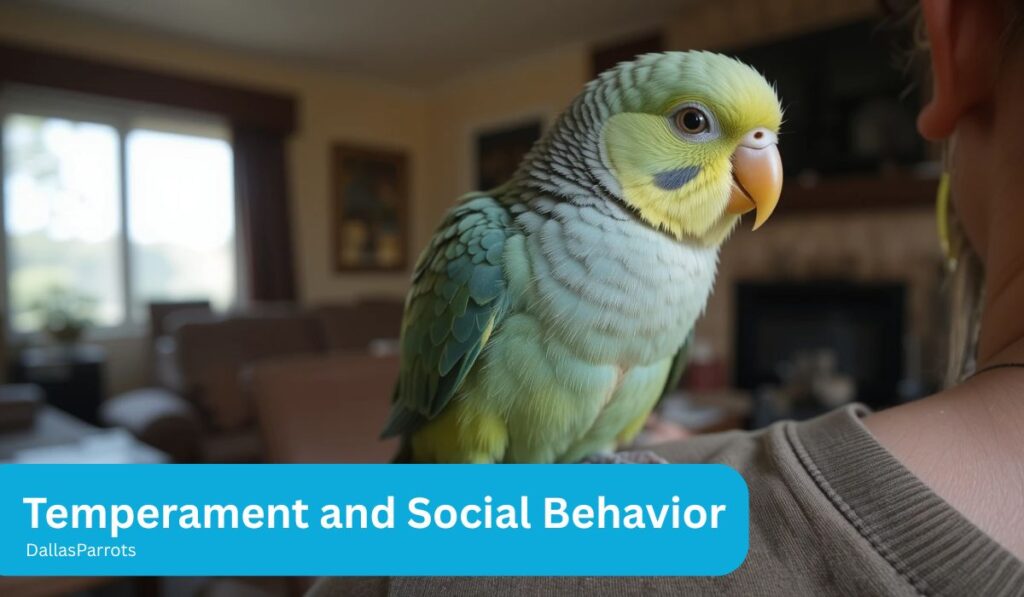

Lineolated Parakeet Price, Lifespan, Care & Complete Guide
Lineolated Parakeet, or Linnie, is a small and strikingly beautiful parrot, known for its charming and playful nature. Originating from Central America, this bird is admired for its calm temperament and unique appearance. Unlike many other parrots, Lineolated Parakeets have a quiet demeanor, making them suitable for apartment living and a great option for those looking for a less noisy companion. They are small yet have a strong, affectionate bond with their owners, making them one of the most lovable pet parrot species.
Lineolated Parakeets are easy to train and are often described as intelligent, curious, and social. They enjoy interacting with their owners and can be trained to do basic tricks or even mimic sounds, though they are not as vocal as other parrots. Their beauty, combined with their gentle personality, makes them an excellent choice for those seeking a small parrot that’s both manageable and enjoyable to care for.
Get Our Delightful Lineolated Parakeet at Dallas Parrots
Looking for a unique companion? Our Lineolated Parakeet is the perfect choice. Known for their friendly nature and captivating beauty, these parrots make wonderful pets. Head over to dallasparrot.com to find your new feathered friend today!
Lifespan of Lineolated Parakeets
The Lineolated Parakeet usually lives for around 10 to 15 years, but with dedicated care and a healthy environment, their lifespan can extend to 20 years or beyond. Ensuring a long and healthy life for your Linnie depends on several factors:
Diet: A well-balanced parakeet diet plan is essential. Providing fresh foods, along with parakeet vitamin supplements, ensures they get the necessary nutrients for longevity. A diet high in fresh vegetables and low in seeds is particularly beneficial for their overall health.
Genetics: The quality of the bird’s genetic background plays a significant role in its lifespan. Birds bred from healthy, reputable sources tend to have fewer health issues and a longer life expectancy.
Care: Regular vet visits, a safe and appropriate parakeet habitat, and minimizing exposure to parakeet toxins such as household cleaners or unsafe plants all contribute to a longer life. Proper attention to their needs and a stimulating environment is crucial for maintaining their health over the years.
Temperament and Social Behavior

The Lineolated Parakeet (Linnie) is renowned for its calm and affectionate nature, making it an excellent companion for pet owners seeking a quieter bird. Unlike other more vocal species, Lineolated Parakeets are typically low in noise, making them ideal for those living in apartments or spaces requiring peace.
Calm
The Lineolated Parakeet is generally a calm bird, with minimal tendencies for loud, disruptive noises. Unlike other pet parrot species, they are not known for screeching, making them ideal for quieter environments like apartments.
Cuddly
These parakeets are renowned for their affectionate nature and their ability to form strong bonds with their human companions. They are known to seek attention and can be very cuddly, often sitting on their owner’s shoulder or lap, displaying their loving nature.
Social
A social bird, the Linnie enjoys both human interaction and bonding with other birds. With proper parakeet socialization, they form strong connections, making them a wonderful addition to a multi-pet household or an environment where they receive consistent attention.
Ideal Housing Setup for Lineolated Parakeets
A Linnie flourishes best in a spacious, well-furnished habitat designed specifically for parakeets.. The cage size should allow ample room for movement, and placing the cage in a safe, comfortable environment promotes both physical and mental well-being. Safe materials like stainless steel ensure safety, while safe enrichment items keep the bird engaged and active.
| Factor | Recommendation |
| Cage Size | A minimum of 18″ x 18″ x 24″ is suitable, but larger cages are always better. |
| Cage Placement | Place the cage in a well-lit, draft-free area, avoiding direct sunlight or heat sources. |
| Materials | Opt for stainless steel cages with wide bars for safe parakeet exercise. |
| Safe Enrichment | Include perches, parakeet toys, and a suitable substrate like paper or coconut fiber. |
Proper Diet & Feeding
A well-rounded parakeet diet is key to keeping your Linnie healthy and happy. Below are important considerations for feeding:
Proper Diet & Feeding Tips
-
- Pellet Diet: Provide a high-quality parakeet pellet diet as the main food source. These pellets are nutritionally balanced and ensure your Linnie gets all the necessary vitamins and minerals.
-
- Feeds: Limit parakeet seed mix to occasional treats. Seeds should not form the majority of their diet due to their high-fat content.
-
- Toxic Foods to Avoid: Never feed chocolate, avocado, or onions. These foods are highly toxic to parakeets and can cause severe health problems.
By following a proper parakeet feeding schedule and offering a balanced mix of food, you’ll be helping your Lineolated Parakeet thrive.
Physical and Mental Enrichment Needs
Lineolated Parakeets are highly active birds that require daily exercise and mental stimulation to remain content. Regular out-of-cage time for flight, engaging toys, and consistent training help keep them happy and mentally healthy.
| Enrichment Activity | Recommendation |
|---|---|
| Out-of-Cage Time | Provide at least 2 hours of daily free flight for healthy exercise and discovery. |
| Toys | Rotate toys often to maintain interest and avoid mental stagnation. |
| Training & Interaction | Engage in simple training and interactive games to enhance mental sharpness. |
Basic Grooming and Hygiene for Lineolated Parakeets
Ensuring they receive frequent baths helps maintain clean and healthy feathers, promoting natural oil distribution. Nail trimming is crucial to prevent overgrowth, which could result in discomfort or potential injury.
Additionally, maintaining a clean cage by regularly replacing parakeet bedding and substrate helps prevent harmful bacteria buildup. Routine care in these areas ensures your Lineolated Parakeet remains comfortable and in optimal health.
Here are the grooming practices
Bathing
Offer regular baths to your parakeet to help maintain the cleanliness and health of their feathers. This promotes natural oils and prevents dryness.
Nail Trimming
Trim your Linnie’s nails as needed to prevent overgrowth, which can cause discomfort or injury. Regular checks will help maintain optimal nail length.
Cage Cleaning
Make sure to clean the bedding and substrate every week to prevent the accumulation of harmful bacteria in your parakeet’s environment. A clean living space is essential for maintaining your bird’s hygiene and promoting its overall well-being.
Common Health Concerns for Lineolated Parakeets
Lineolated Parakeets are generally known for their resilience, but like any pet, they can experience certain health problems. It’s important to observe your bird closely for early signs of illness, such as lethargy, loss of appetite, or changes in droppings.
Regular vet visits and keeping their living environment clean are essential to prevent most health concerns. Respiratory infections are one of the most common issues, often caused by poor ventilation or damp conditions. Feather plucking can indicate stress, illness, or boredom, and should be addressed immediately. Abnormalities in the beak, whether due to injury or poor nutrition, should also be monitored closely.
Can Lineolated Parakeets Talk?
Lineolated Parakeets are not renowned for their talking skills, but with consistent training, some can learn to mimic simple sounds and a few words. These birds are more quiet and reserved, making them a great choice for apartment living where noise can be a concern. They are more appreciated for their calm demeanor and ability to bond deeply with their owners rather than for vocalization.
How to Train and Socialize Your Linnie
Training a Lineolated Parakeet is a rewarding experience that requires patience and positive reinforcement. Linnies are quick learners when provided with consistent, gentle commands.
Training Tips
-
- Offer treats as rewards for desired behaviors.
-
- Use clear and consistent commands to help your parakeet grasp expectations and respond effectively.
Bonding Exercises
-
- Spend quality, undistracted time with your Linnie to build a strong trust bond.
-
- Encourage parakeet socialization by interacting frequently and providing enrichment activities that stimulate both their body and mind.
Color Mutations and What They Mean
| Aspect | Details |
| Popular Colors | Green, Blue, Yellow, Violet |
| Impact on Price | Rare color mutations can significantly increase the price, but they do not affect the parakeet’s temperament. |
Is a Lineolated Parakeet Good for Beginners?
Lineolated Parakeets are an excellent option for beginners due to their gentle disposition, quiet demeanor, and manageable size. These birds are naturally social and tend to bond quickly with humans, making the experience of ownership more rewarding for first-timers. Though they do need consistent care, they are less demanding than many larger parrot species and adapt well to domestic environments.
-
- Beginner-Friendly: Their calm and affectionate nature makes them ideal for new owners.
-
- Low Noise Level: They are quieter than many parrots, perfect for apartments or shared spaces.
-
- Moderate Care Needs: While daily interaction and a balanced diet are essential, they don’t require specialized handling.
-
- Trainability: Respond well to gentle training and can learn basic commands easily.
-
- Adaptable: Can thrive in smaller spaces if enriched with toys and regular interaction.
Compatibility with Other Birds
Lineolated Parakeets are generally friendly and peaceful, making them suitable for homes with other bird species. However, when introducing a new bird, it’s important to do so gradually to avoid triggering territorial behavior. It is advisable to avoid keeping them with aggressive or overly dominant birds, as this could cause stress and conflict. Proper introductions and careful monitoring will help foster harmonious relationships among multiple birds.
Conclusion
Lineolated Parakeets make excellent companions for those looking for a small, affectionate, and quiet parrot. These charming birds can live for many years with proper care, offering both companionship and low noise levels. However, before purchasing, it’s important to thoroughly research their specific needs and consult with an avian veterinarian. With proper housing, diet, and enrichment, Linnies can thrive and bring joy to your home for many years to come.
FAQ's
What is a Lineolated Parakeet and why is it called a “Linnie”?
The Lineolated Parakeet, often affectionately called “Linnie,” is a small parrot native to Central America. It’s known for its gentle, calm temperament and subtle, lined feather markings, which give it the name “Lineolated.” These birds are social, affectionate, and perfect for quieter living spaces.
How long do Lineolated Parakeets live?
With proper care, Lineolated Parakeets typically live 10 to 15 years, though some may reach 20 years or more. A balanced diet, regular vet care, and a clean, enriching environment are key to extending their lifespan.
Are Lineolated Parakeets noisy?
No, Linnies are among the quietest parrot species, making them ideal for apartments or shared spaces. While they can mimic some sounds and words, they are not known for loud vocalizations like larger parrots.
What do Lineolated Parakeets eat?
Linnies thrive on a high-quality pellet diet, supplemented with fresh vegetables, limited seeds, and safe fruits. Avoid toxic foods such as chocolate, avocado, and onions. Proper nutrition helps maintain their health and longevity.
Can Lineolated Parakeets be trained?
Yes, Lineolated Parakeets are intelligent and trainable. They respond well to gentle, consistent training using positive reinforcement like treats and praise. Many can learn simple commands and tricks over time.
Do Lineolated Parakeets need a companion?
While they enjoy human interaction, Linnies also do well with other friendly birds. Introductions should be gradual and monitored closely to ensure compatibility. Avoid housing them with dominant or aggressive species.



